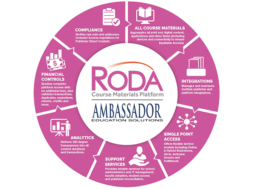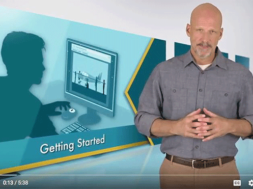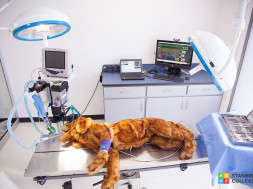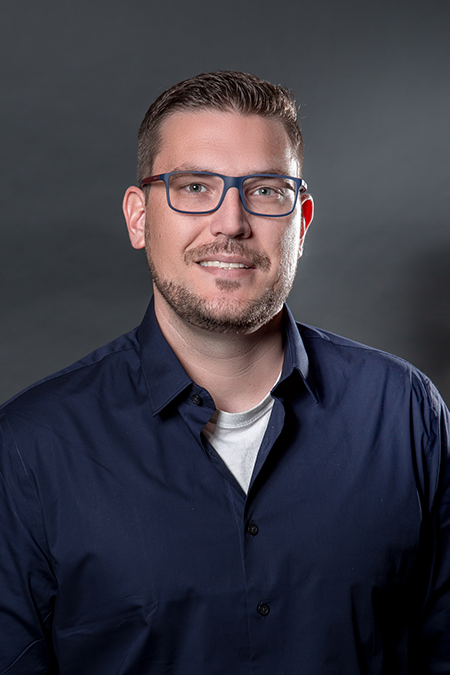
Woz U’s President: ‘Agility is at the Forefront of What we do’
Interview with Chris Coleman, President, Woz U
Woz U isn’t your normal name for a higher-education institution. But then Woz U isn’t your normal university.
Company president Chris Coleman says Woz U incorporates novel ways of teaching students coding and tech education, while also getting graduates into the workforce quicker so they can fill gaps in high-paying technology jobs.
So … what exactly is Woz U?
Woz U is an education as a service company that launched in October 2017 after a year of planning and building the systems, curriculum and staff, Coleman says. It is named after and inspired by Steve “Woz” Wozniak who revolutionized the tech industry in 1978 when he built the Apple II computer.
“Our intent is to make these technology-based programs more available, more affordable and more effective for as many students as possible,” Coleman says. To achieve that goal, the company constantly works to add partnerships that will bring programs to more students, regardless of their location, economic status or age. While Woz U is a licensed certificate-granting school in Arizona, it also reaches many students outside of the state by working with partnership schools.
Students have 24/7 access to online programs with live access to instructors and mentors, high-quality video-based curriculum and comprehensive career services.
Coleman says their goal, agility in education, is what really sets Woz U apart from other higher education institutions.
Their tagline, Education. Reprogrammed., fits in perfectly with that goal. With a team experienced on the employer side of technology, they understand the challenges facing the private sector.
“A lot of the schooling and training that students are getting … aren’t matching the skills that we need because the private sector moves a lot faster than education can,” Coleman says. “So agility is at the forefront of what we do, and our goal is to make sure that all of our programs (and) all of our content … is driven to be as current and as effective as possible.”
The second thing that sets Woz U apart is that it delivers education incrementally, Coleman says. The university offers accelerated programs using flexible curriculum that allow students to finish their schooling and get into the workforce as quickly as possible.
“To do that, we’ve designed a proprietary module of curriculum that’s very personalized,” Coleman says. Take software development as an example. “There are a lot of core principle foundations that everybody needs to know, that transcend whatever language, vendor … or technology you’re using,” he says. “But what makes us unique is (that) we take those base objectives and we replicate them to support many different languages…” Understanding that the top hiring companies in a city drive demand in a region, Woz U tailors the toolkit students get through the program and the languages and technology that they learn.
“If you’re in Phoenix, a lot of the larger companies are using Java,” Coleman says. “You go to San Francisco and there’s a big trend for Java Script. You go the East Coast and there are a lot more Ruby-based companies. We can take our students through the same base objectives and base knowledge but tailor the toolkit that they get through the program. We believe that helps the outcomes of our students.”
In some cases, students who are business owners will come to them and ask to learn specific skills because they have an idea for a software product. “We can talk them through the benefits of the different languages and (determine) what’s best suited for their goal,” he says.
However, the goal for many of Woz U’s students is to just get a job in the field. So Woz U will tailor students’ paths to the curriculum that will help them improve their chances of getting hired afterward.
Woz U also tailors its content to suit different goals. Thus, if Woz U was to work with a partner that wanted to offer a six-week high school summer school program that teaches basic front-end web development, they could reassemble their content and deliver that, he says.
“Everything is market driven. It’s a lot of hands-on application. This is not a linear program where you’re reading through the chapters and taking the tests,” he says. “There’s a lot of very incremental, practical hands-on application of the skills that you’re learning.”
Besides giving students practical experience in the industry, their learning platform also allows the company to systematically review and provide individual feedback based on the exercises that each student completes.
“That gives us a lot of great analytics on the performance of our students,” he adds. It also allows them to get the high performing students in front of employers, while giving additional support for its lower-performing students.
In addition, in cases where they determine that students are struggling with a particular exercise, they can send that unit or exercise back to their curriculum team for revision, he says.
Coleman says none of this is licensed or contracted; it’s all built in-house. “So we immediately see the impact of our program on our students through their analytics, and we can immediately make adjustments in the curriculum so that the next class, the next cohort that comes through, gets a revised version.”
In traditional education, textbooks are often used for years. “We all know that in technology it’s going to change in six months,” he says. “We’re changing things daily. We’re changing things in alignment to the feedback we’re getting from our students, from the employers and from our instructional staff.”
The third thing that makes Woz U stand out from other higher education institutions is its technology centric approach to how instructors teach. “We looked at a lot of the existing educational platforms … and what we found was that they’re not built with technology in mind; they’re built kind of traditional,” Coleman says. “So we built our own to make sure that we could control the experience for our students, and that it could be a more effective and more immersive experience.”
But it’s not all about the tech, he stresses. “The tech is (only) there to help support these fantastic educators who are committed to making sure that the students are successful. We want to support them and empower them by making sure … they have data on the performance of their students and they have tools at their disposal to be effective.”
Students can connect with instructors online or on campus, he says. In addition, students are partnered with mentors who are available to give them help whenever they need it.
Where are Woz U campuses located?
While Woz U is mainly online, Coleman says the university currently has one physical campus at its headquarters in Scottsdale, Arizona. But they are working to add partnerships and bring additional campuses under the Woz U umbrella.
“Our strategy is not necessarily for us to grow additional facilities,” he says. “But we’ll be working with established partnerships that have facilities in major cities to be able to bring this kind of ground campus immersive format out.”
That’s part of their education as a service model goal, where they will work with established brands that are committed to bringing effective technology programs forward.
Coleman says Woz U anticipates rolling out 15-16 physical campuses, and they hope to make one announcement about a partnership shortly. In fact, the university already has a partnership with Southern Career Institute. “They were an early adopter,” he says, adding that they worked with SCI to bring technology programs to their students. SCI also services a lot of Woz U’s online students, he says.
For other schools wanting to work with Woz U, Coleman says all they need to do is reach out to him or someone else from the team. “We would essentially look at what their goals are and what they are trying to accomplish, (determine) what’s preventing them from reaching those goals, and how Woz U could help and service them,” he says. Once gaps are identified, Woz U would come in as a service team and try to supplement those gaps.
What programs does Woz U currently offer?
Woz U online currently offers the following programs: software developer, data science and cyber security. A mobile developer program will also launch this year, Coleman says, and they’re also planning out the next three or four program to be launched.
The software development program teaches “full staff web development,” Coleman says, and students create a meaningful software product before they leave. Their data science program, launched in November 2017, is a hybrid between programming and statistics. Their cyber security program started in January 2018 with a goal to work through network defense, defend networking systems, improve hardware security and secure software systems.
All current offerings are certificate-based programs, he says. “However, we’ve structured our system and our content to be able to be constructed in a way to support degree-based programs as well,” Coleman says. “But getting degree-based programs approved is a long and daunting process, and we are about agility.” So Woz U will be able to support schools interested in degree-based programs, he says, but it will take longer to get those things to market.
In addition, depending on the partner, Woz U students can receive Title IV funding, Coleman says. “Southern Careers Institute is accredited and approved for Title IV funding, and we do service our students through that partnership.”
Building the curriculum
Woz U builds its curriculum in a methodical way. “We start by doing an analysis and a marketplace of what’s needed,” Coleman says. For instance, when starting the school they looked at what jobs were in the highest demand and discovered it was jobs in software and web development, followed by data science, cyber security and mobile development, respectively. Not surprisingly, those are the programs they decided to start first.
Next, they looked to the industry to find someone to lead that initiative as the program chairman. They are really looking for candidates with three things: experience in the field, an educational background and a background in hiring.
“We’re looking for somebody who comes from industry with 10-plus years of experience at relevant companies that you may have heard of before,” Coleman says. “They understand the field, and they understand the challenges.”
Secondly, they want to make sure the person has some type of background, exposure or affinity to education. That could be as an adjunct, in training or instructional design, or even as manager of the training program at his or her company.
Thirdly, Woz U looks for people who have hired others in the field and who have decided which applicants are qualified. “That’s something that has been missing from traditional academia,” he says. “We’re certifying that these students are prepared because the person that we have that oversees the effectiveness of the program … has hired 50, 100, 200, 250 people for this role.”
Coleman says you need to hire a program chairman who understands what the industry is looking for. “Then we set out to model the program, create our syllabus, create our objectives and design it in a way that each of these different courses or learning modules is as isolated as possible,” he says. In a typical 24-week program, there may be eight courses that end with a group or capstone project. But in the technology field, there is a constant risk for needing drastic change, he says.
As an example, Coleman talks about working for a company that had a great educational product built on Adobe Flash. “When Apple decided to stop supporting Flash, they killed that technology and essentially put our entire business at risk overnight. They also put every educational institution that was teaching Flash at risk overnight. That’s scary for education. It’s scary for students. It’s scary for technology as a whole. But guess what? It’s not going to change.”
That’s why Woz U structured its program to isolate that risk, he says. So if a particular programming language would die today, they would just pull that unit out, replace it with a supplemental language and address the languages that are now in demand.
“Likewise, if a certain topic becomes irrelevant, we don’t want to revise the entire 24-week program,” he says. Instead, they would change a two-week unit within the program. “That’s agility,” Coleman says. “That allows us to quickly make an adjustment and get back to being effective for our students. It reduces the risk of exposure to these changes in technology.”
Coleman says all of their content is video driven and all videos are recorded in-house. “We have a very structured way of producing the content,” he says. “Every lesson and topic is followed by hands-on exercises.”
That allows students to learn concepts in bite-sized portions. “You’re going to learn; you’re going to apply it. You’re going to learn the next piece and you’re going to apply it,” he says. “At the end of the unit, you bring it all together, you create something that’s meaningful, and then you move on to the next topic.”
Then, at the end of the program, students build a project that solves a real-world problem.
Lastly, once a program is launched, the university immediately begins a rapid feedback review cycle to ensure they are keeping content current, Coleman says.
Offering student lifetime access to curriculum
Woz U offers lifetime access to its rapidly evolving curriculum. “We want to promote lifelong active learners,” Coleman says. “Technology shifts rapidly, and in the tech field, your education is kind of the starting point.”
What happens if someone moves to a different area or a different company that has different technology needs? In most cases in the past, students had to learn that new technology on their own. But Woz U wants to keep its students and alumni current.
“As our curriculum continues to update, as we branch out and add additional languages, additional technology, digital tooling – all of those things are available to our students for life,” Coleman says. “We want to keep them involved and engaged in our community and in our network…”
Coleman says the first piece of their Coder for Life program is lifelong access to their curriculum. The second piece is lifelong access to career services.
“So if students have … graduated and they’re struggling to get hired, or they’ve ready to move on to a new stage in their career, we want them to come to speak with our career services team,” he says. Those career services staff members are in tune with the trends and the marketplace, and can review their resume or social media to see how they’re positioning themselves, he adds.
There is a huge demand for people to fill tech jobs, in part due to a tremendous gap between computer science graduates and the number of job openings. Last year there were 530,000 active computer-related jobs listed, compared to 60,000 computer science graduates, Coleman says. So even if students graduated 10 years ago, Woz U will help them get current, trained, positioned to market themselves and be comfortable in interview settings. “That’s our career commitment to them,” he says.
Third, Woz U also offers discounted tuition on alternate programs. That’s meant for students who want to change fields. “We offer them a deep discount to come back to us and take it with us as opposed to somebody else,” he says.
Coleman says the company is challenging two major things in education. “We don’t like the notion of a linear education,” he says. “We want it to be dynamic. We want it to be branching. That’s why this modular curriculum gives our students so many options.”
Secondly, Woz U doesn’t like education to be transactional. “I had a great experience at my university. But in 16 years of my career I’m yet to really have a need to go back,” Coleman says. “Shouldn’t that relationship be more life-long? Shouldn’t it be more incremental as opposed to one or two major transactions and major commitments in your life with major financial implications?”
Woz U is promoting a more hybrid model that will allow students to go back to school part-time at a more reasonable cost.
“Let’s challenge that notion of a very linear and very transactional education and let’s make it more a lifelong process, almost like fitness would be,” he says.
How to attract talent to the field?
While Coleman acknowledges that it’s difficult to attract more talent to the tech industry because it is intimidating to many, it’s also important to remember that all of the companies that create the languages and the tooling to build these systems are heavily invested in making them easier to use and opening them up to a broader audience.
“But I don’t think the rest of the world realizes that they’re doing that,” he says. “Programming, data science and cyber science techniques are all significantly easier than they were 15 years ago. But I don’t think people understand that.”
Coleman says Woz U tries to ensure that their audience knows this is a career that can be accessible to them, and they start that message at the K-12 level. “We have an entire K-12 division that is working in primary schools,” he says. “Working from the employer backward, we find the demand in the industry and we create a career training program to meet that demand.”
What’s the future of higher education?
Coleman predicts higher education will develop into a hybrid model that is more incremental and agile. “I think that technology has been lacking in education,” he says. Just as people don’t shop like they used to, monitor their health like they used to, or even get a taxi they way they used to, people no longer want to be educated the way they were in the past.
“Education has made some good gains, but it just isn’t moving at the same rate as some of the other industries,” he says. “I think we’re going to see a lot of gains in technology, but I don’t think we’re going to see a purely technology driven focus. I think it’s always going to involve high-quality educators, a personalized touch and interaction with people. That hybrid model is where things are going.”
In addition, people no longer want to commit to 4-8 years to complete their education. “I think we’re going to see more incremental progress toward skills-based output,” Coleman says. Employers really care more about an employee’s ability to demonstrate his or his skills because they have a vacancy and they need it filled now.
But agility is also going to be key in higher education. “I’m envisioning a future where … what you’re learning wasn’t written 3 or 4 years ago, or maybe even 3 or 4 months ago,” Coleman says. “Static content is going to go away, and we’re going to get a lot closer toward real-time relevancy in the content and the curriculum that we’re teaching. Technology is going to lead us along a lot of that. But it’s going to take a lot of really radical educators who want to push on this front.”
CHRIS COLEMAN is President of Woz U, a technology-based education start-up that is enhancing the Education as a Service model, empowering students with effective and affordable career paths in technology. He is leading initiatives to advance individualized learning systems with programs that accelerate professional development and instill skills for their students to distinguish themselves in the workforce.
Before Woz U, he redefined the coding bootcamp model by introducing a personalized modular curriculum and proprietary online learning platform as CEO of Coder Camps. This model enabled Coder Camps to provide a uniquely effective education, which was customized to meet the regional demands of technology employers. He served as COO of the company for a year, before being named its chief executive.
Previously, Chris was the Director of Software Engineering for HealthTrio, where he led the development of HealthTrio Connect, a SaaS healthcare platform serving more than five million members. Prior, he was Vice President at Mindplay, an edtech company, where he led the development of Virtual Reading Coach, a K-12 online learning platform for struggling readers. Virtual Reading Coach was an award-winning pioneer of adaptive and individualized learning in the literacy space. Chris spent his early career as a Software Engineer for Archon Technologies, later acquired by 3M.
Chris graduated with a B.S. in Computer Science from the University of Arizona. Connect with him @chrisecoleman on Twitter.
Contact Information: Chris Coleman // President // Woz U // chris.coleman@woz-u.com // Twitter: @chrisecoleman // LinkedIn: https://www.linkedin.com/in/chrisecoleman/










